DO-IT News May 2014

Volume 22, Number 2
Below are the articles of the DO-IT News May 2014 newsletter. These articles can also be seen all on one page at the Full Newsletter option.
Director's Digressions
As most of our readers know, the Disabilities, Opportunities, Internetworking, and Technology (DO-IT) Center is located at the the University of Washington (UW). However, DO-IT is primarily supported with funds external to the UW.
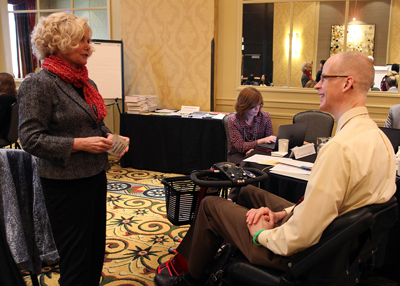
The largest contributor to DO-IT efforts is the National Science Foundation (NSF). With funding from the NSF, (Award #HRD-0227995 and #HRD-0833504), DO-IT leads AccessSTEM, a regional alliance with Seattle Public Schools, UW, Seattle Central Community College, and Bellevue College. AccessSTEM works to increase the participation and success of people with disabilities in science, technology, engineering, and math (STEM) academic programs and careers. AccessSTEM recently sponsored a capacity-building institute (CBI; see related article).
DO-IT is also part of the NSF's multi-campus Center for Neurotechnology (CNT), which is led by the UW under NSF Award #EEC-1028725. In its role, DO-IT ensures engagement of individuals with disabilities, including veterans, in project activities and the universal design of products developed through the Center. As a partner in the Promoting Equity and Engineering Relationships (PEERs) project, DO-IT is funded by NSF's Innovation through Institutional Integration (I3) program under Award #HRD-0833338. PEERS is a collaborative effort toward making the culture in the UW College of Engineering more supportive of women, minorities, students with disabilities, and other underrepresented groups.
In DO-IT's Collaborative Dissemination Project (NSF Research in Disabilities Education Award # HRD-0929006), we lead projects to broaden the participation of people with disabilities in sharing resources and interventions for the purpose of maximizing their collective impact.
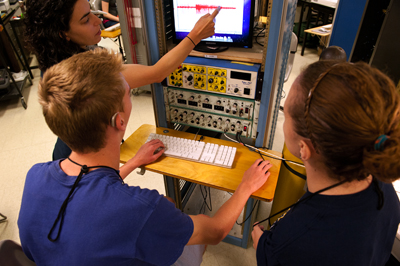
The National Oceanic and Atmospheric Administration's (NOAA) Award #NA-100AR4320148 funds a participant in the DO-IT Scholars program, which prepares young people with disabilities for college, careers, independent living, and leadership roles in society. The DO-IT Scholars program, as well as other state-wide efforts to increase the success of students with disabilities, is primarily funded by the State of Washington.
The Boeing Company supports DO-IT's collaboration with Seattle Public Schools; the Accessible Career and Technical Education program serves to make materials and curricula more accessible to students with disabilities (see related article). Mitsubishi Electric America Foundation funds the AccessSTEM CAREERS project to provide career development services to postsecondary students with disabilities in the region.
So, as you can see, DO-IT relies on the support of many funding sources for its ongoing activities. In addition to these funds, we receive contributions, big and small, of individuals who value the work that we do.
The AccessSTEM National Capacity-Building Institute
On February 25-28, DO-IT's AccessSTEM project at the UW hosted a CBI focused on sharing interventions to promote the full inclusion of people with disabilities in STEM postsecondary programs and careers. The event was held in Seattle and was attended by more than fifty participants from around the country, including individuals who currently serve in projects funded by the NSF's RDE project, past RDE project leaders, individuals with disabilities, and representatives from key professional organizations.
The CBI was collaborative. Short presentations by participants were followed by discussion groups to share expertise, practices, and funding ideas. Major topics included faculty and staff engagement in universal design; transition supports; technology access; and interventions that support STEM students with disabilities through academic coaching, mentoring, and other activities.
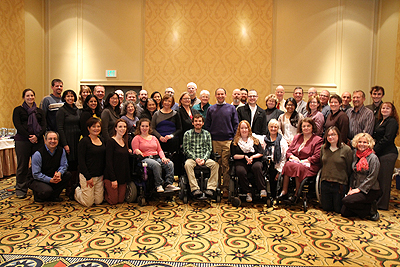
Some practices suggested for replication include the following:
- Adapting and creating a lending library of accessible science equipment similar to the set at Bellevue College.
- Offering summer bridge programs.
- Starting outreach early—like the National Center for Woman and Information Technology's AspireIT Middle School Outreach Program (www.ncwit.org/project/aspireit-middle-school-outreach-program).
- Widely distributing ways to make the web more accessible—like 30 Web Accessibility Tips (www.uw.edu/accesscomputing/get-informed/publications/brochures/30-web-accessibility-tips).
- Developing a peer mentorship program for campus veterans—like the Virginia Commonwealth University Veterans Education and Transition Supports in College program (www.worksupport.com/vets).
In a highly-rated activity on the second day of the CBI, four STEM students with disabilities participated in a panel presentation. While discussing the impact of technology on her education, one of the panelists shared her story: "I used to have a one-on-one [personal care attendant] with me. A large part of me becoming independent was technology I was given [to] control my computer with my voice. It truly changed my life." Another panelist talked about how programs aimed at increasing diversity in STEM changed her outlook: "I never thought I would be doing research and presenting about it. Because of programs aimed at increasing diversity in the field, I was exposed to experiences I wouldn't have had otherwise."
The CBI was funded by a supplemental grant from the NSF to DO-IT's AccessSTEM project (Grant #HRD-0833504). Find more information at www.washington.edu/doit/programs/accessstem/overview. CBI event proceedings will be posted online in the coming months.
AccessComputing Engaged at Tapia Celebration of Diversity in Computing
Every year the Association of Computing Machinery's hosts the Tapia Celebration of Diversity in Computing (tapiaconference.cmd-it.org/). The conference brings together undergraduate and graduate students with educators and professionals in computing fields who are from diverse backgrounds. One of the conference's goals is building community among groups that are underrepresented, including individuals with disabilities.
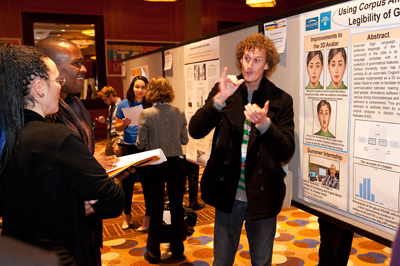
AccessComputing was well represented at this year's event, held in Seattle on February 5-8. AccessComputing was a Bronze Sponsor of the conference and many AccessComputing student team members were awarded travel scholarships to attend.
For the first time, AccessComputing held a "Birds of a Feather" session to bring together attendees with disabilities. The session was well-attended—over twenty people came, including individuals with disabilities, educators, and other advocates. The discussion focused on raising awareness of AccessComputing's resources and activities, ways of creating more community among individuals with disabilities, and establishing greater visibility of disability at future Tapia Celebrations.
The Alliance for Access to Computing Careers (AccessComputing) helps students with disabilities successfully pursue undergraduate and graduate degrees in computing fields, and works to increase the capacity of postsecondary institutions and other organizations to fully include students with disabilities in computing courses and programs. These activities are funded by NSF Grant #CNS-1042260. Find more information at www.washington.edu/accesscomputing/.
DO-IT's Partnership with Boeing
The DO-IT Center is collaborating with the Seattle Public Schools' Career and Technical Education (CTE) department to increase the successful inclusion of students with disabilities in program options. DO-IT began by working with the Skill Center programs.
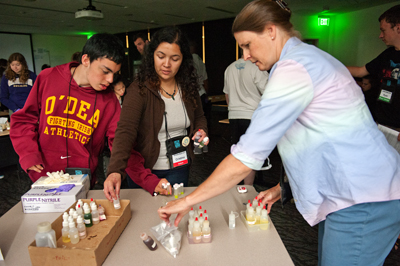
The school district launched the Skill Center program in Fall 2012, with new classes added each year. At present, there are six program offerings, which includes aerospace science and technology, information technology, culinary arts, digital animation and gaming, fire science, and medical careers. The Skill Center is staffed primarily by teachers with a background in industry focused support, and encourages universal design of instruction to reach all learners. By designing instruction for students who are diverse in ability, age, race, ethnicity, reading level, learning style, and other characteristics, instructors lessen the need for individual accommodations and increase the potential of success for all students.
In addition, DO-IT is engaging a range of CTE staff through discussion lists and the creation of web resources related to the full inclusion of students with disabilities. DO-IT's collaboration with CTE is funded by the Boeing Company.
Code.org Videos Now Audio Described for Blind Students
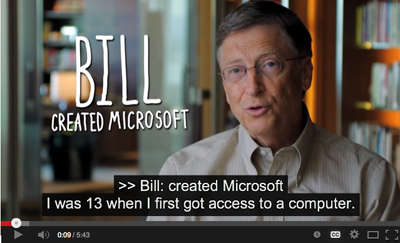
In collaboration with Code.org, AccessComputing worked with Audio Eyes, an audio description company, to make Code.org's signature inspirational video accessible to blind students.The video features a variety of celebrities—famous technology leaders, musicians, and professional athletes—talking about the importance of learning to write programming code. The video quickly went viral after its release in 2013, and for a while was the #1 video on YouTube with over ten million views.The original video includes on-screen text that identifies each speaker (for example, "Bill: Created Microsoft"). People who are unable to see the on-screen text don't necessarily know who's speaking, which is a key part of what makes the video so inspiring. In order to make this information accessible, the added audio description supplements the program audio with occasional brief narration that verbally announces essential visual content and identification of the speakers.
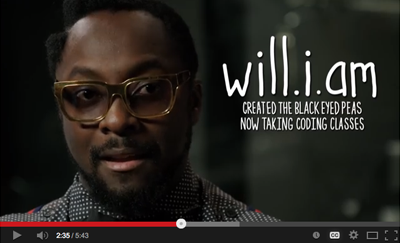
The described video is now available in three versions (9-minute, 5-minute, and 1-minute) at www.youtube.com/playlist?list=PLzdnOPI1iJNfVcl-HBqMAGyZBNIsTxz4V.
Myths About Internships
DO-IT maintains one of the most robust and vibrant internship programs in the country. In the last three years, participants in DO-IT programs have completed over 250 challenging internships. Check out the following myths—and facts—about internships.
MYTH: Interns usually do beginner-level tasks or grunt work.
FACT: Interns are often involved in complex and important projects.
MYTH: Internships are really hard to get and only go to top students.
FACT: Placement can be competitive, but there are a lot of places to look.
MYTH: Interns work for free, and an internship won't help me get a permanent job.
FACT: Some internships are paid, and all internships can help students build their professional network for future job searches.
MYTH: Internships aren't worth much unless I can get academic credit.
FACT: Even if they don't give credit, internships help students build resumes and learn valuable skills.
MYTH: An internship is the same thing as a part-time job.
FACT: Internships are different from part-time jobs, because interns are expected to be learning new skills.
MYTH: Internships always happen during the summer.
FACT: There are year-round opportunities for internships.
MYTH: There are no special internship programs for students with disabilities.
FACT: Yes there are! Here are a few examples:
- AccessSTEM https://www.washington.edu/doit/accessstem-team-application
- AccessComputing www.uw.edu/accesscomputing/team_app.html
- ENTRY POINT! ehrweb01.aaas.org/entrypoint/ep-students
- American Association of People with Disabilities Internship Program aapd.com/what-we-do/employment/internship-program
The Thread: Air Travel with a Wheelchair
I wanted to share with you a question posed by a DO-IT Scholar in our Internet discussion forum and some of the responses so that you can get the flavor of the many rich conversations the DO-IT community has online. Featured responses are from DO-IT Ambassadors (those who have completed the DO-IT Scholars program), and DO-IT Mentors, who are academics and professionals who provide mentoring to DO-IT participants. Some forum posts are edited for clarity and brevity.
[My sister] recently broke her leg and has been transporting herself around in a lightweight folding wheelchair. For spring break she is taking a trip. The airline told her she can decide once she gets to the airport whether she wants to gate-check the wheelchair at the end of the jetbridge next to the plane, or check it like normal baggage at the ticket counter. The airline will use one of their wheelchairs to move her around the airport and onto the plane if she wants.
My question is, based on your experience, which should she choose—gate or baggage- Do you have any other advice or travel tips for her- She is staying in an accessible hotel room, but she is afraid of not being able to open and close the door to her room fast enough before the card key times out.
DO-IT Ambassador: If she wants to use her wheelchair in the airport she should do a gate check. In regards to the hotel room door, I have the same issue, and I travel a lot. On your way into the hotel, you can ask in the lobby if someone can come up to your room with you and hold the door. To get out, just call the front desk or bell stand and ask if they can come up and help with the door.
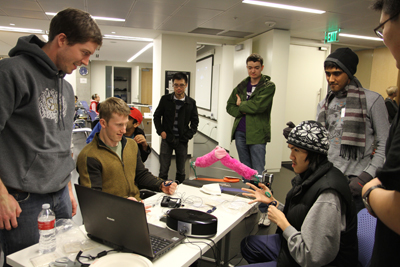
DO-IT Mentor: I've traveled quite a bit by air myself. I can walk, but use a chair for long distances, so I feel like I have some similarities to your sister. I've used airport chairs and been pushed by staff, and it's usually not a big deal. There might be a better chance of her chair not getting lost or broken if she gate checks it. (I've received chairs in worse condition after a flight, but if her chair is your standard "hospital chair," there's less of an issue.)
DO-IT Ambassador: I am a permanent chair user so I have my chair gatechecked. In terms of damage risk: I think gatechecking or baggage checking has equal risk. The chair is put into cargo anyway so people handle it roughly. In your sister's situation, transferring to an airport chair at check-in would probably be most convenient.
DO-IT Ambassador: If she feels confident that she can navigate the airport in her chair, then she should gate check. I prefer that because I am more in control of how my chair is handled. I usually ask to talk to the people loading the luggage onto the plane before I give them my chair. I tell them how important it is that they be careful, and that they should not throw it. This might seem like common sense, but once they see me and understand the situation, they are much more respectful with my chair. I've had chairs break on several occasions, but not since I've started being more vocal.
As for the hotel room, ask for someone to walk up with you so that you can test it out. Usually it's fine for me, but you never know!
DO-IT Ambassador: If there is room on an airplane, a manual, collapsible wheelchair may be stowed within the cabin. If she does gate check, this would be ideal. Also, when bringing a chair through security, expect to spend ten extra minutes being swabbed for chemical residues.
Call For Articles

DO-IT is pleased to announce a new online publication, Universal Design in Higher Education: From Principles to Practice, in which practitioners share promising practices related to the application of universal design in postsecondary education settings. This collection of promising practices complements the more general content in the printed book, Universal Design in Higher Education: From Principles to Practice, published by Harvard Education Press (www.hepg.org/hep/Book/83).
The new publication is available online at https://www.washington.edu/doit/resources/books/universal-design-higher-education-promising-practices. It can be freely copied and distributed as a book or in part for noncommercial, educational purposes.
The collection in the online publication will continue to grow as more articles are submitted. Articles should include specific ways practitioners and researchers have applied universal design in postsecondary settings along with evidence of success.
Submitted articles are peer-reviewed by members of the Universal Design in Higher Education Community of Practice (udhecop@uw.edu), and if accepted, edited by DO-IT. For author guidelines, consult the preface of the book at https://www.washington.edu/doit/preface-0.
How Can You DO-IT?
- Sign up to receive DO-IT News if this newsletter was not mailed directly to you.
- Volunteer as a Mentor or to help with one of our Summer Study programs.
- Pass this newsletter on to someone you know who can benefit from our programs.
- Donate money to support and extend DO-IT activities including sponsoring Scholars from states outside of Washington, special events, work-based learning experiences, participant attendant or travel costs, refreshments for program participants, and creation and distribution of educational videotapes and publications.
DO-IT today by completing the form below! You may also make a secure online credit card donation at the University of Washington Make a Gift page by selecting the "DO-IT Program Gift Fund" option.
___ Sign me up to receive copies of DO-IT News, a free program newsletter.
___ Send me more information about DO-IT volunteer opportunities.
___ I would like to make a donation (payable to the University of Washington, Federal ID#91-6001537) to support DO-IT operations.
___ I have enclosed a check for $____________
___ Please charge $____________ to my credit card.
___ VISA ___ Mastercard Date _____________
Card Number __________________________ Expiration Date _____________
Card Holder Name ___________________________________________________
Signature _____________________________________________________
Address ____________________________________________________________
City __________________________ State _____________ Zip ____________
Phone: Home __________________________ Business ____________________
E-mail: ____________________________________________________________
Your gift is tax-deductible as specified in IRS regulations. Pursuant to RCW 19.09, the University of Washington is registered as a charitable organization with the Secretary of State, State of Washington. For more information, call the Office of the Secretary of State, 1-800-322-4483.
Mail to:
DO-IT
University of Washington
Box 354842
Seattle, WA 98195-4842
Thank you!
More About DO-IT
DO-IT News is published at the University of Washington with input from DO-IT staff, Pals, Scholars, Ambassadors, and Mentors. DO-IT is primarily funded by the National Science Foundation, the U.S. Department of Education, and the State of Washington.
DO-IT (Disabilities, Opportunities, Internetworking, and Technology) serves to increase the successful participation of individuals with disabilities in challenging academic programs such as those in science, engineering, mathematics, and technology. Primary funding for DO-IT is provided by the National Science Foundation, the State of Washington, and the U.S. Department of Education. DO-IT is a collaboration of UW Information Technology and the Colleges of Engineering and Education at the University of Washington.
Grants and gifts fund DO-IT publications, videos, and programs to support the academic and career success of people with disabilities. Contribute today by sending a check to DO-IT, Box 354842, University of Washington, Seattle, WA 98195-4842.
Your gift is tax deductible as specified in IRS regulations. Pursuant to RCW 19.09, the University of Washington is registered as a charitable organization with the Secretary of State, state of Washington. For more information call the Office of the Secretary of State, 1-800-322-4483.
To order free publications or newsletters use the DO-IT Publications Order Form; to order videos and training materials use the Videos, Books and Comprehensive Training Materials Order Form.
For further information, to be placed on the DO-IT mailing list, request materials in an alternate format, or to make comments or suggestions about DO-IT publications or web pages contact:
DO-IT
University of Washington
Box 354842
Seattle, WA 98195-4842
doit@uw.edu
www.uw.edu/doit
206-685-DOIT (3648) (voice/TTY)
888-972-DOIT (3648) (voice/TTY)
206-221-4171 (fax)
509-328-9331 (voice/TTY) Spokane
Founder and Director: Sheryl Burgstahler, Ph.D.